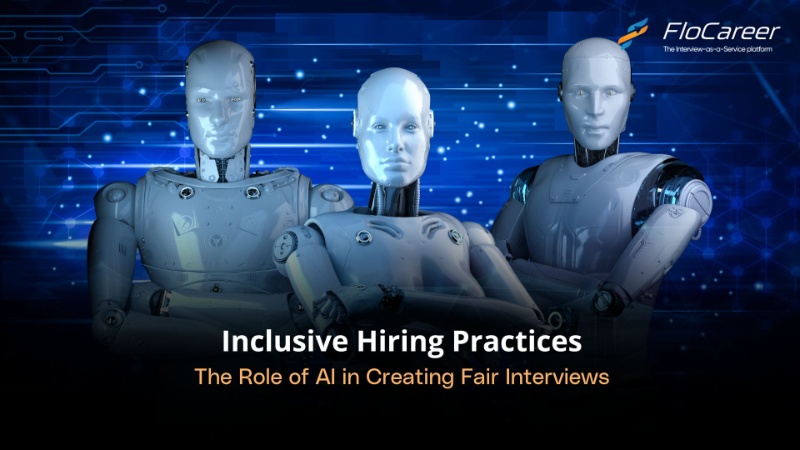Inclusive Hiring Practices: The Role of AI in Creating Fair Interviews
Ensuring fairness in the recruitment process is a cornerstone of ethical hiring practices, but the prevalence of hidden biases raises questions about the true objectivity of interviews. Research from Harvard University in 2012 exposed biases where both male and female interviewers favored male candidates, even when female candidates possessed equivalent qualifications. This issue extends beyond gender, with studies highlighting discrimination based on race, ethnicity, age, physical ability, and LGBTQIA+ status. To address these challenges, the integration of AI-powered interview intelligence platforms becomes pivotal in achieving unbiased hiring processes.

Understanding Interview Bias and Discrimination:
Interview bias and discrimination occur when candidates face unfair treatment based on factors such as race, religion, gender identity, age, caste, and physical disability. Despite regulations like the US Civil Rights Act of 1964, there's room for improvement in eradicating biases from recruitment processes. AI emerges as a potent solution to mitigate these biases, ensuring that candidates are evaluated on merit and qualifications alone.
How AI Can Minimize Interview Bias:
Structured Interviews:
AI facilitates the creation of structured interviews with predefined patterns and templates. This approach ensures consistency in the hiring process by preventing interviewers from deviating from standardized questionnaires. Structured interviews not only enhance hiring and candidate experiences but also provide a sense of order, reducing the risk of manual bias in questionnaire preparation.
AI Interviewer Training:
Proper training is essential in reducing bias and discrimination. AI-driven interviewer training equips interviewers with an understanding of interview bias, protected classes, and the technical aspects of the hiring process. Training fosters empathy within the recruitment team and hones interviewers' skills, enhancing their ability to assess candidates objectively.
Video and Audio Analysis:
AI systems excel in detecting non-verbal cues during interviews. This capability offers valuable insights to the recruitment team, identifying gaps in interviewer skills. With actionable feedback, hiring managers can guide interviewers to improve their performance, ultimately contributing to a positive candidate hiring experience.
Feedback Compliance:
AI provides real-time feedback to interviewers, ensuring that interviews align with predefined standards. Platforms like Flocareer's live interview guidance offer capabilities to provide instant feedback, addressing issues such as long pauses. Interviewers can also provide feedback on candidate responses, streamlining the decision-making process in recruitment.
Natural Language Processing (NLP):
AI-driven NLP algorithms can analyze language patterns used during interviews. By understanding the subtleties of language, these algorithms can identify and flag potential biased or discriminatory phrases, ensuring that the interview process remains inclusive and free from unintentional biases.
Diversity-Focused Algorithms:
Implementing algorithms specifically designed to enhance diversity in candidate selection can be a powerful tool. These algorithms take into account diverse backgrounds and experiences, promoting a more inclusive hiring process by mitigating biases that may favor certain demographic groups.
Anonymous Candidate Screening:
AI can facilitate the initial stages of candidate screening without revealing personal information. By anonymizing resumes and removing identifiable details, AI ensures that the evaluation is solely based on qualifications and skills, minimizing the impact of unconscious biases related to names, gender, or background.
Continuous Monitoring and Calibration:
AI systems can continuously monitor and calibrate interview processes based on feedback and performance metrics. This iterative approach allows the system to adapt and improve, ensuring that any biases that emerge are promptly identified and addressed, contributing to an increasingly fair recruitment process.
Dynamic Questioning Based on Responses:
AI-powered interview platforms can dynamically adjust follow-up questions based on candidate responses. This adaptability ensures that the interview remains focused on individual qualifications, avoiding predetermined assumptions or biases. It fosters a more personalized and fair evaluation process for each candidate.
Inclusive Benchmarking:
AI can establish inclusive benchmarks for candidate evaluation. By considering a broader range of criteria and competencies, the system helps eliminate biases associated with a narrow set of traditional benchmarks. Inclusive benchmarking ensures that diverse skills and experiences are valued during the evaluation process.
Multimodal Analysis:
Going beyond verbal communication, AI can incorporate multimodal analysis, which includes assessing visual cues, tone of voice, and facial expressions. This holistic approach provides a more comprehensive understanding of a candidate's responses, reducing the reliance on specific verbal cues that may be prone to biases.
Randomized Question Order:
AI algorithms can randomize the order of questions presented to candidates. This prevents any unintentional bias that may arise from the sequential nature of questioning. Randomization ensures that each candidate faces a unique order of questions, promoting fairness in the evaluation process.
Benchmarking Against Successful Hires:
AI can analyze the characteristics and traits of successful hires within an organization. By benchmarking against these positive outcomes, the system can identify patterns that contribute to success, guiding interviewers to focus on relevant criteria and reducing biases associated with irrelevant factors.
Discrimination in hiring is a modern recruitment challenge, and AI emerges as a potential solution to reduce interview bias and elevate the overall candidate hiring experience. Flocareer's interview intelligence platform is committed to minimizing bias and discrimination in recruitment processes. Beyond enhancing candidate experiences, AI significantly reduces turnaround time, making it an indispensable tool for organizations committed to fair and unbiased hiring.
As organizations strive for fair and unbiased hiring processes, AI becomes a powerful ally in achieving this goal. By leveraging AI technologies, companies can transform their recruitment processes, fostering inclusivity and ensuring that every candidate is evaluated fairly based on their skills and qualifications. Flocareer stands at the forefront of this transformative journey, offering organizations the tools they need to create a truly equitable and unbiased hiring environment.
Check out our latest blog on Diversity in Hiring


